Key takeaways:
- Meditation cultivates awareness and presence, leading to deeper self-understanding and emotional clarity.
- Consistent meditation reduces stress, enhances self-awareness, and improves overall life satisfaction by fostering a sense of appreciation for everyday moments.
- Practicing meditation can significantly enhance focus and presence in daily interactions, allowing for better listening and reduced distractions.
- Key techniques for effective meditation include creating a dedicated space, establishing a consistent schedule, and focusing on breath to anchor the practice.
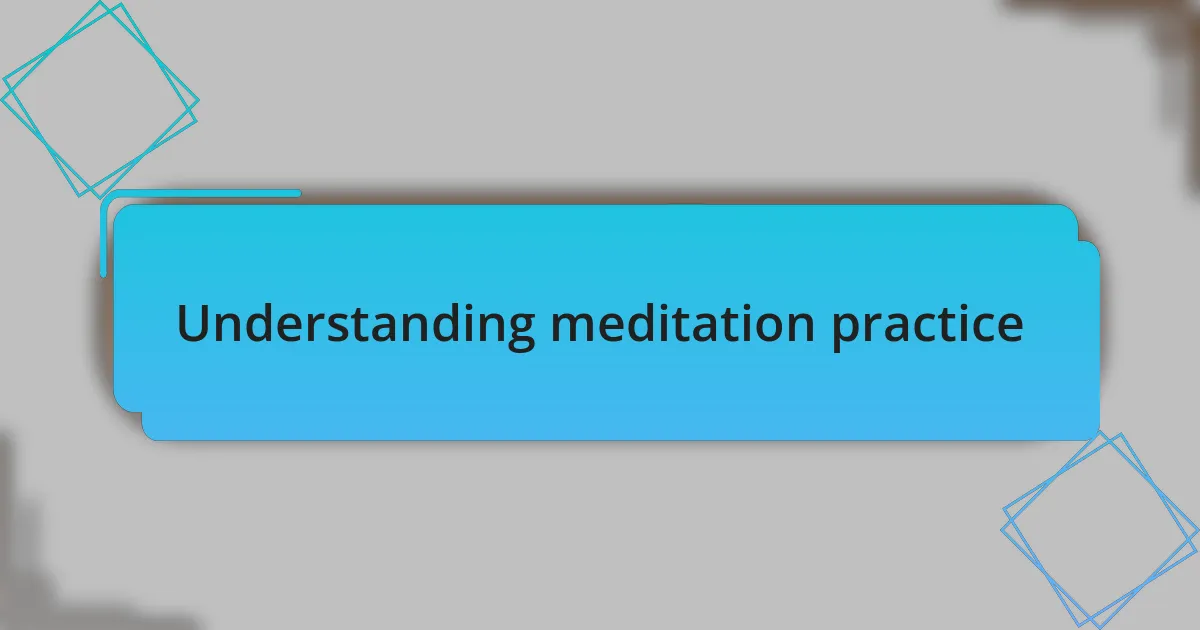
Understanding meditation practice
Meditation practice is fundamentally about cultivating awareness and presence, which can lead to profound personal insights. I remember my first experience with mindfulness meditation; it felt as if I was peeking into my own mind, witnessing thoughts flitting by like clouds while I remained grounded like the sky beneath. Have you ever felt that stillness envelop you, even for just a moment? That’s the power of being present.
At its core, meditation invites you to explore the depths of your consciousness—an inner journey that many overlook in their fast-paced lives. During my sessions, I’ve often confronted uncomfortable emotions, realizing that acknowledging these feelings is the first step towards understanding them. It’s fascinating how such simple practice can unravel so much complexity within us; don’t you find that revealing?
Understanding meditation isn’t just about the techniques; it’s also about the relationship we build with ourselves. Some days, I sit with a sense of restlessness, while other times, I experience deep, transformative peace. This contrast reveals just how diverse and rich our emotional landscape can be. How do your experiences reflect your inner world during meditation?
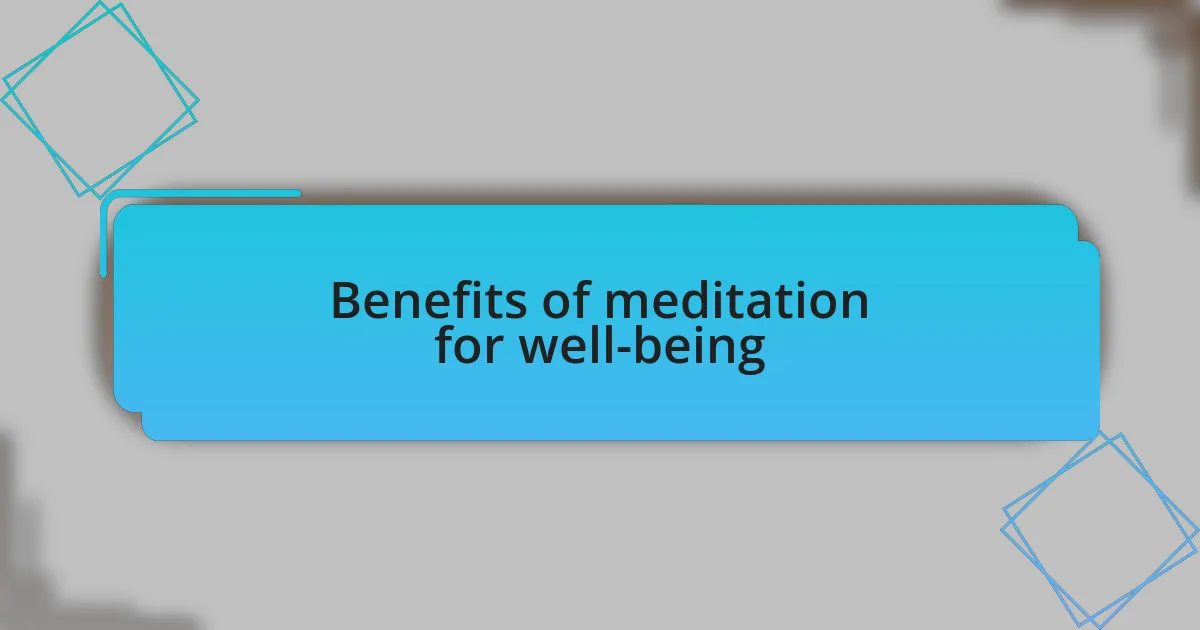
Benefits of meditation for well-being
Meditation significantly enhances emotional well-being by reducing stress and anxiety levels. I vividly recall a particularly overwhelming week when I decided to dedicate time to a daily meditation routine. After just a few sessions, I noticed a remarkable shift; my racing thoughts began to slow down, and I found myself responding to stressors with greater calm. Have you ever experienced that moment of clarity when everything seems a little less burdensome?
Moreover, the practice fosters greater self-awareness, allowing us to observe our thoughts more objectively. I often journal about my feelings post-meditation, uncovering insights that had been buried under layers of distraction. It’s intriguing how this newfound perspective sheds light on my motivations and actions, making them more intentional. How might your life change if you could approach your thoughts with such clarity and intention?
Finally, consistent meditation can improve overall life satisfaction. I’ve learned to appreciate small moments—from sipping my morning coffee to enjoying a quiet walk in nature—simply because I’m more present. This shift in focus has enriched my daily experiences, making even mundane tasks feel more fulfilling. Imagine how differently you might view your daily routine with the gift of mindfulness.
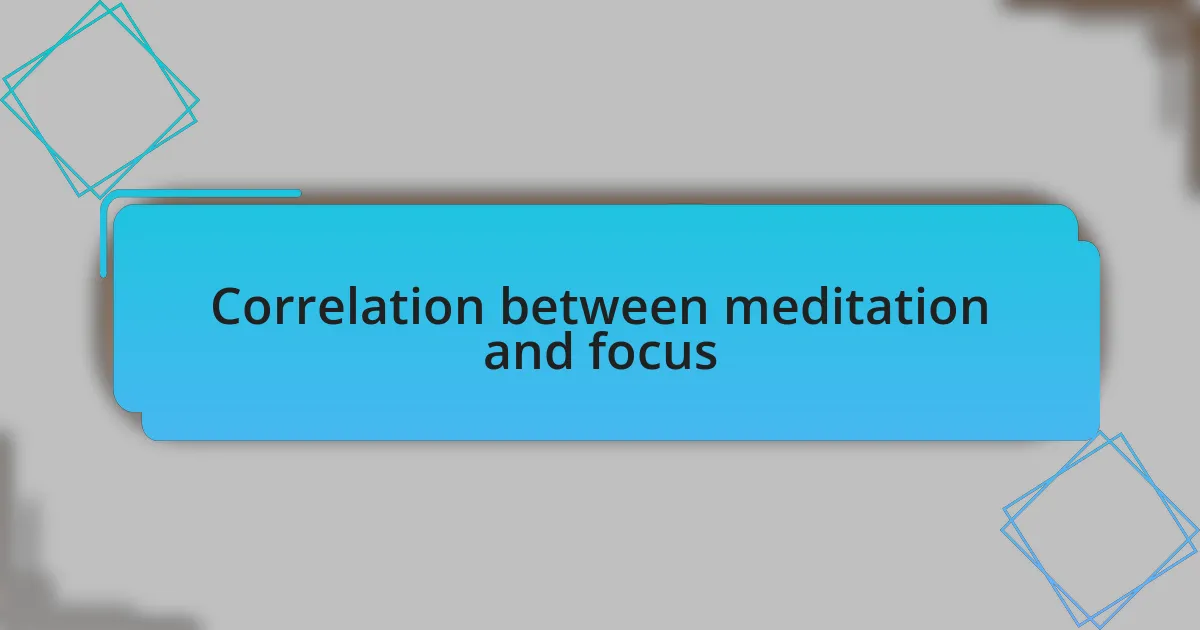
Correlation between meditation and focus
Meditation has profoundly impacted my ability to concentrate. I remember struggling to complete a task due to constant distractions, and it was during one of my meditation sessions that I realized how much mental clutter I was carrying. My mind felt like a crowded room filled with noise, but after honing my focus through meditation, I could gradually filter out that chaos, allowing me to immerse myself in what truly mattered.
I’ve also noticed that the more I meditate, the longer I can sustain my attention on challenging projects. One day, I sat down to tackle a particularly complex report. Instead of feeling overwhelmed, I recalled a meditation technique that encouraged me to focus on my breath. This simple exercise helped center my thoughts, enabling me to work steadily and effectively. Have you ever considered how a few minutes of mindful breathing could pivot your attention back to the task at hand?
Interestingly, the connection between meditation and focus extends beyond just improved concentration; it’s also about being present. During a conversation with a friend, I caught myself genuinely listening rather than mentally preparing my next response. This shift, I believe, stems from my meditation practice. How might our interactions change if we genuinely tuned in to others instead of being distracted by our own thoughts?
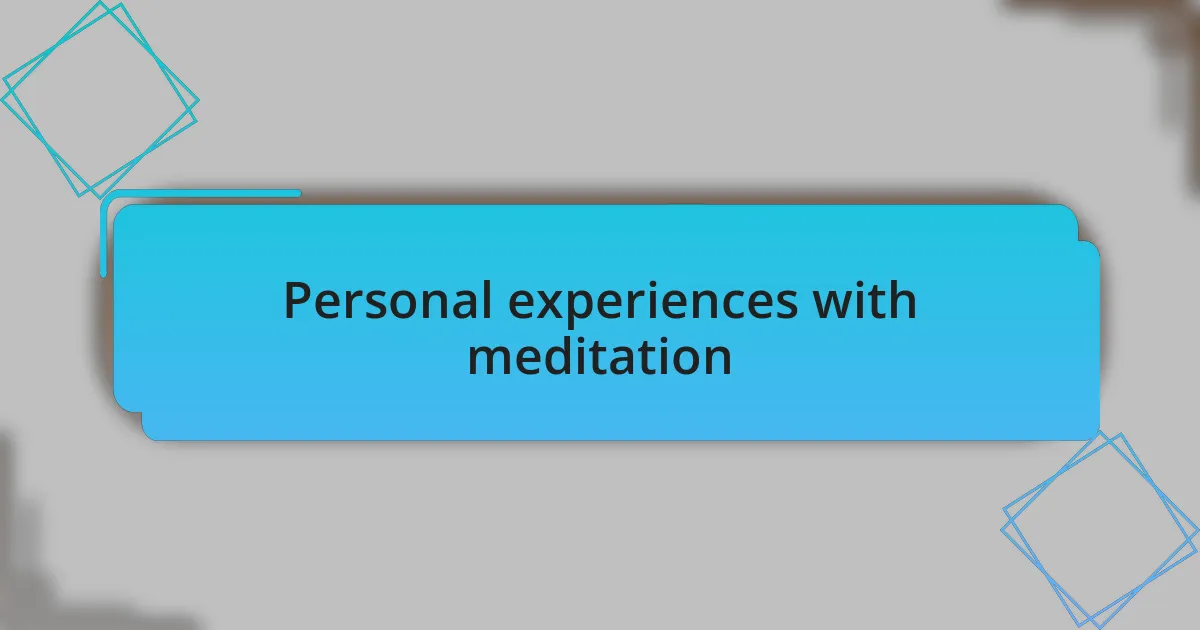
Personal experiences with meditation
Engaging in meditation has been a journey of self-discovery for me. One specific instance stands out; I was sitting in a quiet corner of my home, trying to push through a wave of anxiety that seemed to turn my thoughts into a tangled web. That day, I struggled with lingering doubts about an important decision. As I focused on my breath, I felt a surprising sense of clarity emerge. It was as if each exhale released some of that tension, revealing insights I hadn’t fully acknowledged before. Have you ever experienced a relief so profound that it shifted your perspective entirely?
Another memorable moment happened during a particularly stressful week at work. I had dedicated just ten minutes to meditation each morning, and while I expected nothing more than a little calm, I found it opened a door to creativity. One afternoon, when brainstorming solutions for a project, the ideas flowed effortlessly. It dawned on me that those quiet moments of reflection weren’t just about finding peace; they also sparked inspiration. Could daily meditation be a key to unlocking your creative potential, too?
Lastly, I’ve realized that meditation extends beyond personal well-being; it enhances how I relate to the world around me. One evening, while I was walking my dog, I immersed myself fully in the sounds and sights of nature. The colors seemed more vibrant, and the rustling leaves felt more alive. It struck me then that meditation had trained my mind to savor simple experiences. What if this ability to be present could transform our interactions and enrich our lives on a daily basis?
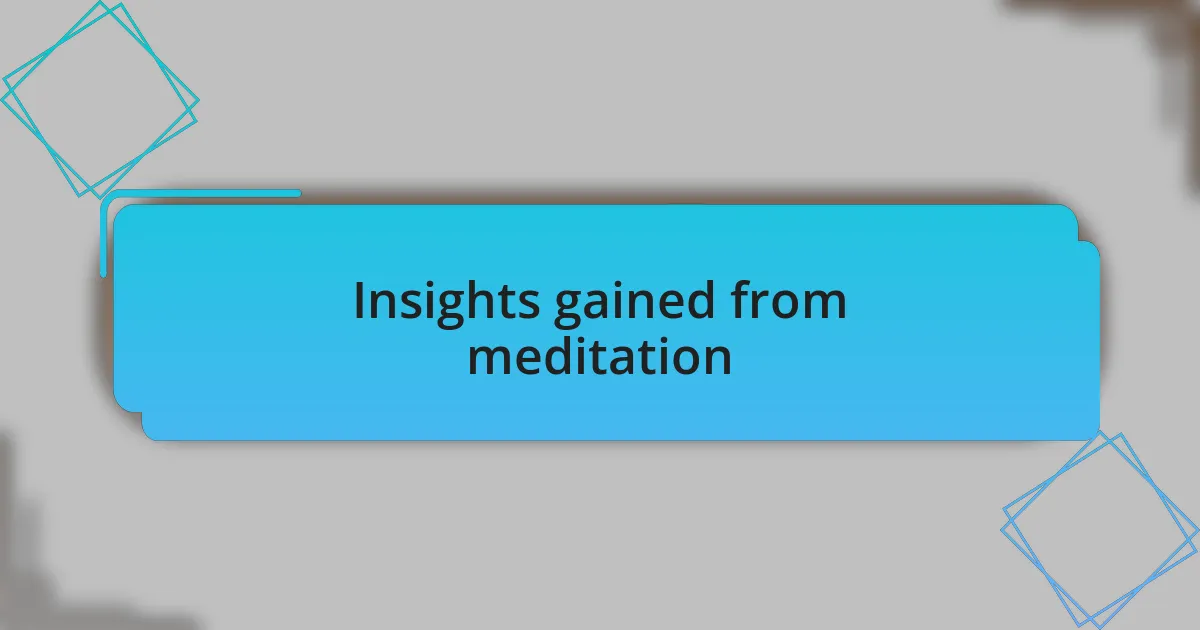
Insights gained from meditation
Meditation has taught me the art of patience, especially during those moments when my mind tends to race. I recall one afternoon, sitting on my balcony as the sun dipped below the horizon. I felt the urge to rush through my thoughts, but instead, I embraced the discomfort and simply observed. As I allowed my thoughts to flow without judgment, I discovered the power of letting go. Isn’t it fascinating how patience can lead to profound self-acceptance?
Another unexpected insight was the connection between mindfulness and empathy. I remember a conversation with a friend that quickly turned tense. Instead of reacting defensively, I paused and took a deep breath, truly listening to their perspective. This small shift, a direct result of my meditation practice, helped me appreciate the emotions behind their words. How often do we miss the underlying feelings in our interactions because we’re too focused on our own agendas?
Perhaps the most significant realization has been the value of self-compassion. One day, I sat on my meditation cushion feeling overwhelmed by past mistakes. Instead of the usual self-criticism, I heard an encouraging voice within, reminding me that growth comes from learning. This gentle shift in how I viewed my struggles opened pathways to healing. Could embracing our imperfections be the key to unlocking resilience?
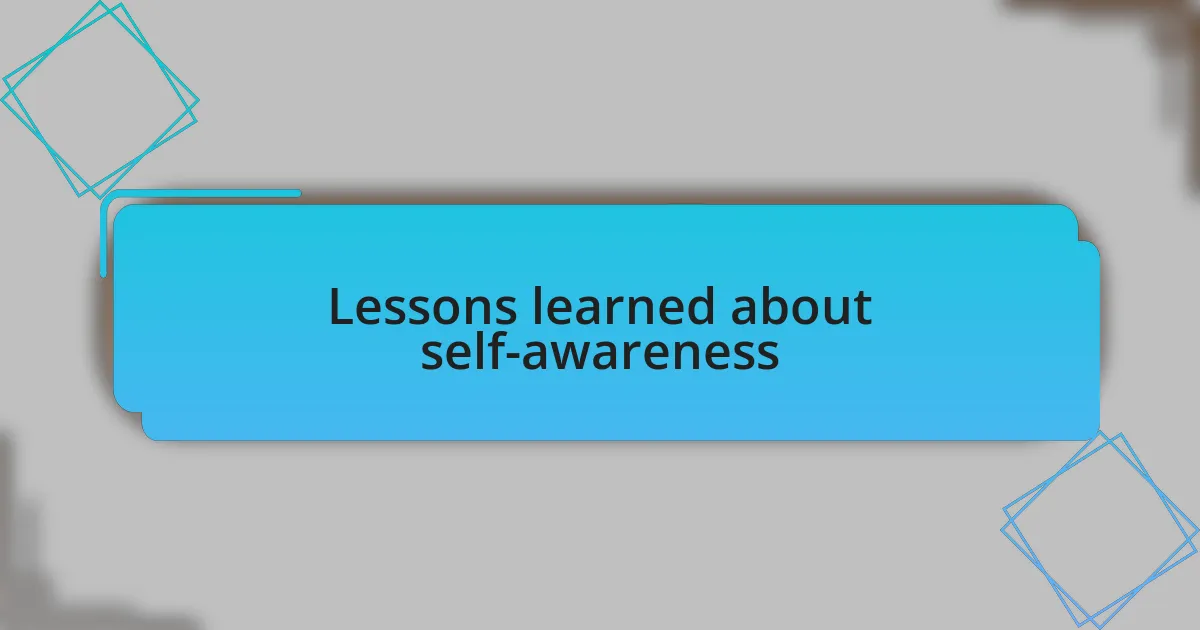
Lessons learned about self-awareness
Self-awareness, for me, emerged as a quiet dawn breaking over a foggy landscape. One morning during meditation, I noticed how easily my mind shifted from thought to thought, almost like a rubber ball bouncing off walls. There was an unsettling clarity in observing this habit. It made me question: why do I cling to certain thoughts while dismissing others? This realization pushed me to explore my mental patterns and understand my reactions better.
In one session, I became aware of how my emotions influenced my daily decisions. Sitting in stillness, I remembered a time when I let anger dictate my response during a heated discussion with a colleague. Reflecting on this, I recognized how a moment of pause could have altered the outcome. Instead of letting my emotions lead, I learned to choose my reactions intentionally, which has greatly enriched my interpersonal relationships. How often do we allow fleeting feelings to steer our paths?
Additionally, I found that self-awareness is not just about understanding thoughts but also about embracing them. During a particularly challenging meditation, a wave of restlessness surged within me. Instead of resisting it, I allowed that discomfort to be present. This acceptance turned into a profound insight about recognizing vulnerability as part of being human. I realized that acknowledging my struggles builds a stronger connection with myself, enhancing my overall sense of authenticity. Isn’t it liberating to understand that we can be both fragile and resilient?
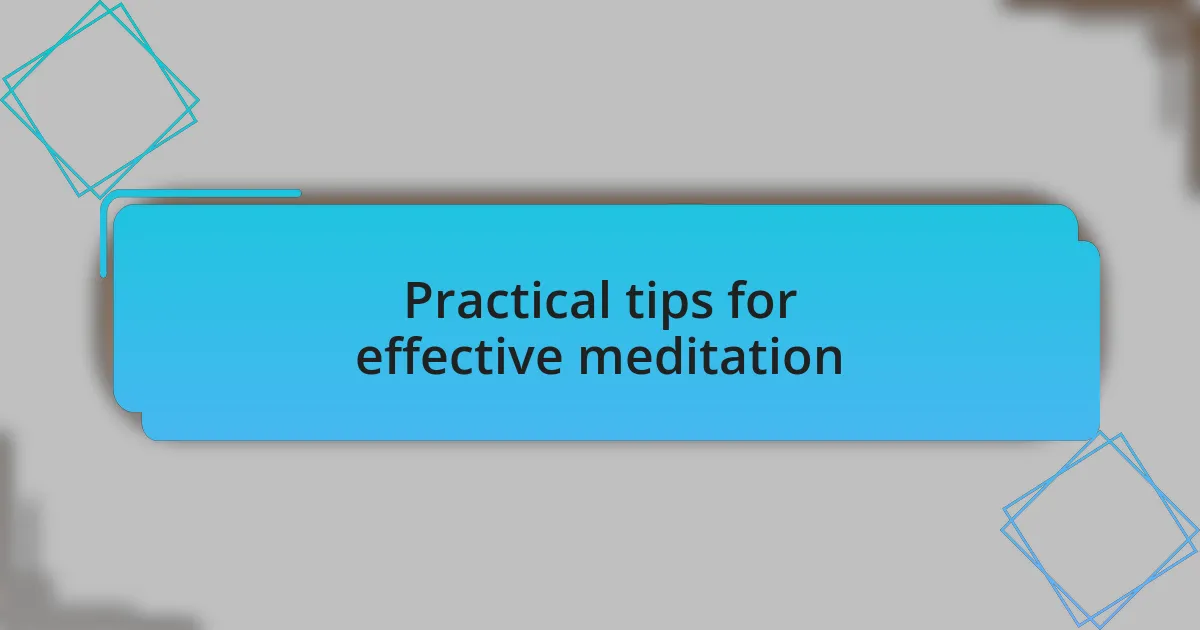
Practical tips for effective meditation
Finding a dedicated space for meditation has been transformative for my practice. I remember when I first started, I was easily distracted by the noise of daily life. Then, I carved out a small corner in my home just for meditation. It became my sanctuary, a place where I could retreat and focus. I believe having that designated space signals to my mind and body that it’s time to engage in deeper reflection. Have you considered what physical space can do for your mental clarity?
Another practical tip that has improved my meditation is setting a consistent schedule. At first, I would meditate sporadically, often feeling rushed or unprepared. I found that by choosing specific times each day, I could prepare myself mentally and emotionally. It became a form of self-discipline, much like brushing my teeth. Isn’t it interesting how routine can foster a sense of stability in our chaotic lives? I now look forward to those moments of stillness, knowing they ground my day.
Lastly, I learned the power of focusing on my breath. Initially, it seemed simple, almost mundane, but it quickly became the anchor for my practice. When my mind wandered— and it often did— returning to my breath acted as a guiding light, gently reminding me to come back to the present. There’s something profoundly calming about just noticing each inhale and exhale. Have you ever realized how one breath can center you amidst turmoil? Embracing this technique has deepened my meditation experience significantly.